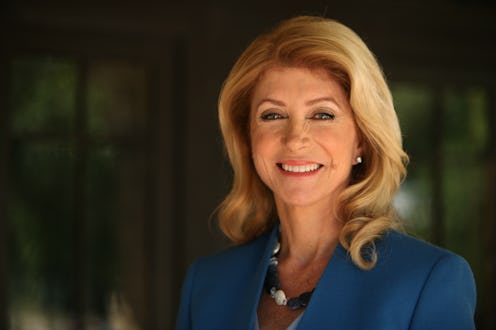News
Wendy Davis Talks SCOTUS' HB2 Abortion Case

On Wednesday, the highest court in the land heard arguments in its first abortion case since 2007, which is arguably the most significant one in decades. The case challenges Texas House Bill 2 (HB2) — an earlier version of which was famously filibustered by then-State-Senator Wendy Davis in 2013. That law has pro-choice activists worried about the fate of abortion access even outside of the Lone Star State. But while she understands the ramifications of the crippling reproductive limits at stake, Wendy Davis believes that the Supreme Court will protect women's access to abortion.
Speaking to Bustle days before Whole Woman's Health v. Hellerstedt — the case challenging the legislation, which has been nicknamed by pro-choice advocates as "the Texas clinic shutdown law" — hit the Supreme Court, Davis is hopeful about its odds. "I feel very optimistic about the Supreme Court in terms of its examination of Whole Woman’s Health because I think that the plaintiff has demonstrated in a very real and very profound way what the substantial burdens have been in real women’s lives in this state," she says.
From the perspective of pro-choice advocates, the term "substantial burdens" is an understatement. While the language of the law does not explicitly shut down abortion clinics, it does mandate that clinicians who provide abortions have admitting privileges at hospitals within 30 miles of their facilities — a severe encumbrance that pro-choice advocates argue effectively translates into shuttering the many clinics which cannot meet these new restrictions.
According to the Center for Reproductive Rights (whose lawyers are representing Whole Woman's Health clinic), HB2's restrictions on Texas abortion providers "[have] already forced the closure of more than half of the 42 clinics previously operating in the state." That's in just over two years since the law went into effect in November 2013. This massive reduction has occurred even before another provision in the legislation — one which requires abortion clinics to have "costly hospital-grade facilities," as Reuters reported — has gone into effect.
"I just can’t imagine that a justice who cares about not wanting to go too far over that line won’t see that the line has been crossed here," Davis says.
However, based on the statements made by Texas Solicitor General Scott Keller, the state intends to claim that the law did not force those clinics to shut down. Keller told Reuters that "the facts don’t bear out" the plaintiff's argument that the mandates in the legislation forced so many clinics in the state to close. Texas politicians have claimed that the law is not meant to provide an unnecessary obstacle to abortion access, but rather is a way to protect women. “We in Texas are always looking for ways to be vigilant about protecting women’s health and protecting innocent life,” Republican Rep. Jeff Leach, who co-sponsored HB2, told the Wall Street Journal.
Whole Woman's Health owner Amy Hagstrom Miller countered in the same Wall Street Journal article that “The standards are just based on politics. They have nothing to do with health and safety.” She explained that the mandates of the legislation provide an unnecessary obstacle for abortion clinics to operate, because an abortion "takes anywhere from five to 10 minutes, there’s no incision, there’s no anesthesia.” In response to Texas legislators' claim that the restrictions are meant to protect women, pro-choice advocates have launched the #StopTheSham hashtag.
The future of Whole Woman's Health and other abortion clinics in Texas largely depends on whether the Supreme Court decides that the current law places unnecessarily burdensome provisions on them. In 1992's Planned Parenthood v. Casey, the Supreme Court's ruling permitted states to impose abortion regulations, but that said regulations could not create an "undue burden" on women seeking abortions.
Davis tells Bustle that after "looking at the way that justices have written on this in the past," she believes the current Texas law fits "some of the statements that have been made about what might constitute that 'undue burden.'" Still, there's good reason for those who value women's access to abortion and reproductive care to be concerned. Since Antonin Scalia passed away last month, there are only eight justices sitting on the Supreme Court, and a 4-4 split would uphold the current Texas law.
Davis makes it clear, though, that Scalia's absence is not the concern. "I don’t think Scalia’s death will have any impact at all on the case. Obviously, a lot of eyes are on Justice Kennedy and what he will do in this case." Anthony Kennedy is seen as the swing vote who could possibly seal the five-justice majority that would strike down the law.
However, even if the ruling is split, Davis says that she's not concerned — at least, not about the larger fate of abortion access throughout the country. "There’s been a lot of fear that if Whole Women’s Health is not successful in turning back the Texas abortion law, then so many other states are going to follow suit on that," she says. "At the very worst, we’ll wind up with a 4-4 split. The good news about that, of course, is that it doesn’t set precedence for the rest of the country."
However, as Davis well knows, that response would be cold comfort for the more than five million Texas women of reproductive age who, according to the Center for Reproductive Rights, may be left with as few as 10 abortion providers in the whole state.
Image: Wendy Davis Campaign